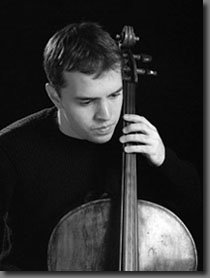Baltacigil on Boyle - and Bach to the Rescue
 The storm that blew young Turkish cellist Efe Baltacigil onto North American stages happened in January 2005 in Philadelphia, and it didn’t so much blow him on there but keep everyone away from it: with most of the orchestra stuck somewhere in the snow, the lone cellist and scheduled soloist Emanuel Ax hastily rehearsed for a few minutes and went on stage to entertain those audience members who had braved the weather. The result was an enthusiastically received Beethoven F major sonata, op. 5, no. 1. The same work opened WPAS’s concert at the Kennedy Center’s Terrace Theater on Tuesday – co-presented by the Young Concert Artists Series.
The storm that blew young Turkish cellist Efe Baltacigil onto North American stages happened in January 2005 in Philadelphia, and it didn’t so much blow him on there but keep everyone away from it: with most of the orchestra stuck somewhere in the snow, the lone cellist and scheduled soloist Emanuel Ax hastily rehearsed for a few minutes and went on stage to entertain those audience members who had braved the weather. The result was an enthusiastically received Beethoven F major sonata, op. 5, no. 1. The same work opened WPAS’s concert at the Kennedy Center’s Terrace Theater on Tuesday – co-presented by the Young Concert Artists Series.
A great future the young man will have (and in fact already has as the associate principal cellist of the Philadelphia Orchestra), but his appearances bear the expectations of hearing something special. It is questionable if he can live up to that at every recital; last Tuesday he could not. The Beethoven, for example, was well played – but lacked any palpable excitement. His partner in crime, pianist Anna Polonsky, made up for some of that here with engaged playing, but she looked more zestful than she sounded: extremes acted out with the body, not always on the Steinway in front of her. Wonderful mezzo-forte and up, she played boldly and didn’t hold back (although a little less wild after the Beethoven). Holding back would not have been necessary, anyway, given Mr. Baltacigil’s rich, voluminous sound. More expressiveness in the soft passages, more subtle shades of piano and pianissimo are on my wishlist for her playing.
Tim Page, Baltacigil Soars On Wings of Faure (Washington Post, April 27) |
After intermission it was Fauré’s Papillon and Chopin’s sonata in G minor. Very lovely, flighty butterfly, that Fauré… but still not particularly convincing as far as the cellist was concerned. In the Chopin he showed us what we knew already: he has fleet fingers, total engagement with the music in front of him, a big tone, a near flawless technique. But his cello never sings, never just plays on its own (only a hint of that in the Largo); it is always pushed, pulled, beaten, driven. That can make for terribly exciting music (I suggest DSCH for a fitting match), but it can also make for listening fatigue, for a subsiding of interest after a while. (This “I’m here, all the time” way of playing may have suited the wide-eyed Boyle sonata best of those four works.) Efe Baltacigil obviously knows how to play the cello – now if he can also be played by the cello on occasion, we will deal with a musician as good as some of the reviews already suggest.
Good thing I did not leave right away (or more precisely: not fast enough), because the proof of much greater capability came hidden in the encore. Not the Gershwin arrangement, although that was nice, too, but the Bach: the Prelude from the C minor Suite (BWV 1011) was magnificent. Finally he let the cello sing. It goes to show that Bach can turn a recital one way or the other: Khachatryan’s Bach left a bad aftertaste following a very fine recital, here Bach was the brilliant finishing touch for a unremarkable recital. So ist das Leben.





















































1 comment:
Just a quick note -- he was really unwell that night and was grateful just to make it through the recital. So while admittedly not his best, I think he played well under the circumstances.
Post a Comment